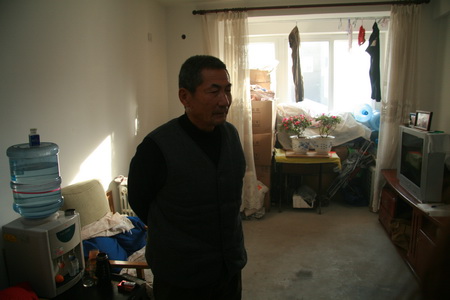Top Biz News
As homes fall, desperation rises
By Lara Farrar and Wang Wei (China Daily)
Updated: 2010-03-05 13:12
 |
Large Medium Small |
Urban villages are also being knocked down at a rapid clip in Beijing.
With their destruction comes the disappearance of complex structures of social and economic dependencies, said Hyun Shin, a lecturer in urban geography at the London School of Economics and Political Science who studied the social impact of urban redevelopment in Beijing.
"They are disconnected from their previous neighbors and are detached from the new community," said Shin. "There might be some trauma and shock, as well as health issues and psychological implications."
 |
|
The new apartment occupied by a 71-year-old soldier surnamed Lu lacks the charm of his demolished home. [CHINA DAILY] |
Relocation can be particularly hard on the elderly, who usually move to the outskirts of Beijing while their children manage remain in the city. This disintegration of the family unit creates new stress when it comes to caring for grandparents who traditionally would have relied on younger generations to look after them, said Shin.
"There are different combinations of living which become very individualized," he said.
A retired soldier surnamed Lu is one example. The 71-year-old had a home that was demolished in the Haidian district village, the same area where Xi set himself on fire. Unlike Xi, however, Lu accepted the compensation developers offered him.
"I didn't want to be in the way of a government project," Lu said.
He now lives alone, renting a transitional housing unit for 1,500 yuan ($220) per month. His son and two daughters have moved elsewhere. During the interview with METRO, a boiling pot of vegetables started to burn on Lu's stove, spreading smoke throughout the small flat.
"I am getting old and accustomed to living on the ground floor, so when I moved into an apartment building, climbing stairs, even three floors, was a difficult job for me," said Lu.
Lu said he misses life in his old house. During summers, he and his neighbors would sit outside and chat.
Despite the home's dismantling, at least Lu still has the fragments of a life he can glue back together and then move on.
For Xi, it is a far different story.
He and his wife, a US citizen, have been in a Beijing hospital for weeks. Xi, who holds a US permanent residence card, is recovering, but the couple have nowhere else to go. No one in their family does.
Xi's family was offered three two-room apartments and 640,000 yuan as compensation. The family rejected the offer.
|
|||
Xi says his self-immolation was not premeditated but instead a spontaneous act of anger and desperation. At the moment, he thought it seemed worth sacrificing his life to protest the destruction of his home.
"I don't think about the future," said Xi. "I don't even see a future."
But he remembers the past fondly.
"The view from the old house was very beautiful," he said while sitting in a wheelchair, blankets wrapped around his scorched skin. "It was a very pretty place."













